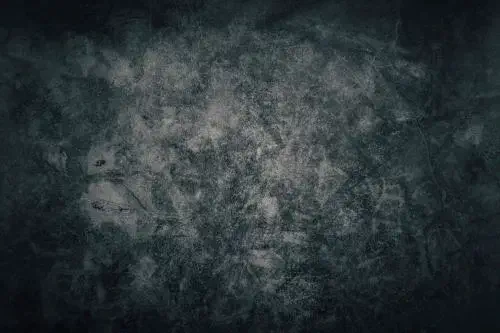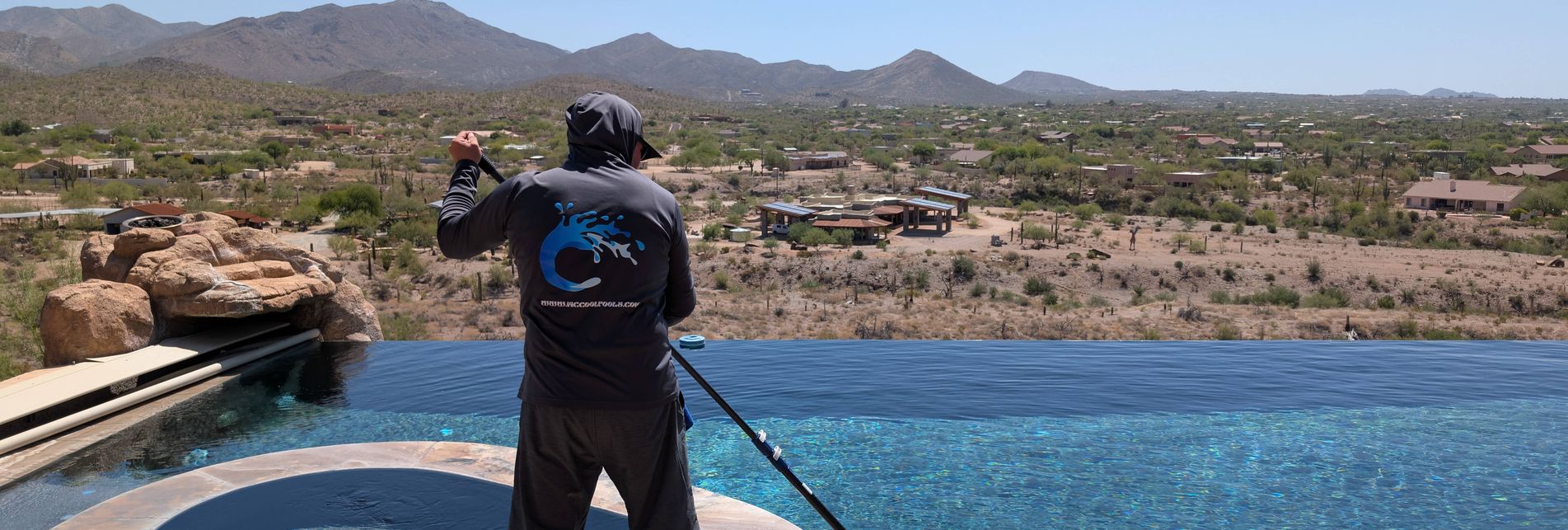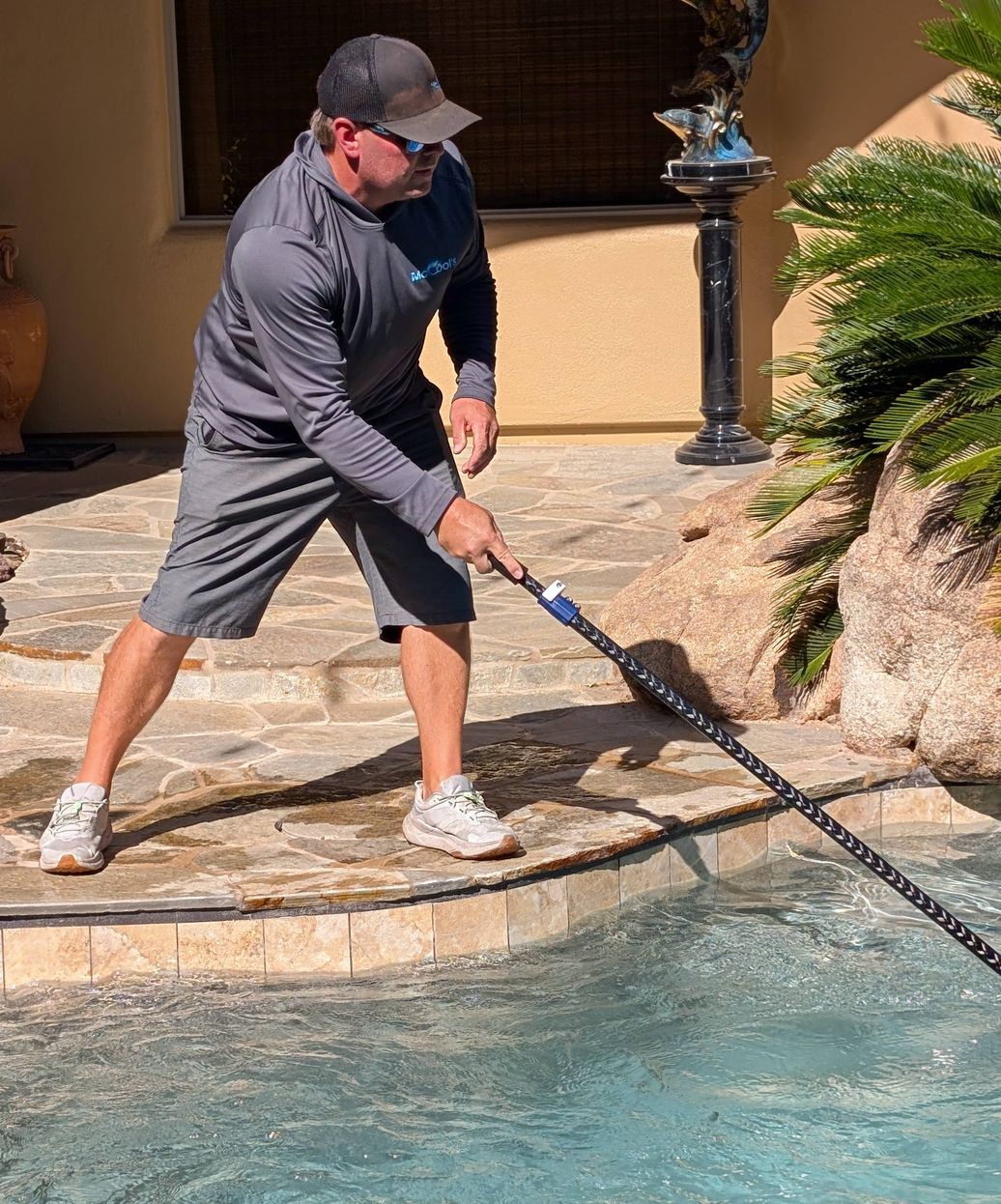Expert Pool Care Tips for Arizona Pool Owners
Professional Insights for Maintaining Your Pool Year-Round
Maintaining a beautiful, healthy pool in Arizona's desert climate requires knowledge, consistency, and attention to detail. At McCool's Pools, we've cared for thousands of pools throughout the Phoenix area since 2005, and we've learned what works—and what doesn't—in our unique environment. Whether you're a new pool owner looking to understand the basics or an experienced owner wanting to improve your maintenance routine, the tips and insights we share here come from nearly two decades of hands-on experience with Arizona pools. Our goal is to help you understand your pool better, avoid common problems, and enjoy crystal-clear water all year long.
Understanding Arizona Pool Challenges
Extremely Hard Water
Phoenix-area water is notoriously hard, containing high levels of calcium and minerals. This creates scaling on surfaces and equipment, requires more frequent filter cleaning, affects chemical balance, and contributes to cloudy water if not properly managed. Understanding that our water chemistry starts with challenges built-in helps you appreciate why proper chemical management is so critical here. You're not fighting your maintenance routine—you're fighting geology.
Intense Sun and Heat
Our desert sun is relentless, accelerating chlorine consumption dramatically. What might last a week in milder climates can be depleted in days here. UV rays break down chlorine continuously, meaning Arizona pools need more frequent chlorine additions or more robust sanitization systems. High temperatures also increase evaporation, concentrating minerals and raising total dissolved solids faster than in other regions. Your pool works harder here, and so must your maintenance.
Dust and Debris
Desert winds carry fine dust and debris into pools constantly. This material loads up filters quickly, creates cloudiness, provides food for algae, and requires more frequent cleaning. Monsoon season brings especially heavy debris loads that challenge even well-maintained pools. Accepting that your pool will need more attention during dusty periods prevents frustration and keeps you ahead of problems.
Temperature Extremes
Phoenix pools experience dramatic temperature swings between seasons and even between day and night. These temperature changes affect chemical reaction rates, equipment operation, and water chemistry stability. Summer water temperatures reaching 90+ degrees create ideal algae conditions, while cooler winter temperatures slow chemical effectiveness. Understanding these seasonal variations helps you adjust your maintenance approach throughout the year.
Get Professional Service
Essential Weekly Pool Maintenance Tasks
Test and Balance Water Chemistry
Testing your pool water at least twice weekly is essential in Arizona's challenging conditions. Check chlorine levels to ensure adequate sanitization—aim for 2-4 ppm free chlorine in traditional pools. Test pH and keep it between 7.2 and 7.8 for swimmer comfort and chemical effectiveness. Monitor alkalinity to buffer pH changes, keeping it in the 80-120 ppm range. In our hard water conditions, tracking calcium hardness helps prevent scaling. Regular testing catches problems early when they're easy to correct rather than waiting until water quality degrades noticeably.
Skim, Brush, and Vacuum
Physical cleaning is just as important as chemical maintenance. Skim surface debris daily if possible—leaves, bugs, and floating material should be removed before they sink and decompose. Brush walls, steps, and corners at least once weekly to prevent algae establishment and remove dirt that filtration alone won't capture. Vacuum or run your automatic cleaner to remove settled debris from the pool floor. In Arizona's dusty conditions, this physical cleaning becomes even more critical than in other regions.
Check and Clean Baskets
Empty your skimmer baskets and pump basket at least weekly, more often during heavy debris periods. Full baskets restrict water flow, reduce filtration effectiveness, and strain your pump. Taking two minutes to empty baskets can prevent hundreds of dollars in pump damage and keeps your system operating efficiently. This simple task is one of the most important things pool owners can do themselves.
Monitor Equipment Operation
During weekly maintenance, listen to your pump for unusual sounds, check for leaks around equipment, verify proper water flow through returns, and ensure your cleaner is moving correctly if you have one. Early detection of equipment issues prevents small problems from becoming expensive failures. If something sounds different or looks wrong, investigate immediately or call for professional assessment.
Maintain Proper Water Level
Arizona's dry climate causes significant evaporation, especially in summer. Keep your water level at the middle of your skimmer opening for optimal operation. Water that's too low can damage pumps by causing them to lose prime. Water that's too high reduces skimming efficiency. Check and adjust water level weekly, adding water as needed to maintain proper level.
Chemical Balance Fundamentals
The Relationship Between pH and Chlorine
Understanding pH is critical because it dramatically affects chlorine effectiveness. At 7.2 pH, chlorine is about 50% effective. At 7.8 pH, effectiveness drops to about 20%. At 8.0 pH, chlorine is only 10% effective. This means high pH can make your chlorine nearly useless, even if test strips show adequate chlorine levels. Always adjust pH before adding chlorine, and maintain pH in the 7.2-7.6 range for optimal sanitization efficiency.
Alkalinity as Your pH Buffer
Total alkalinity acts as a buffer that prevents rapid pH fluctuations. Proper alkalinity (80-120 ppm) keeps pH stable between adjustments. Low alkalinity causes pH to swing wildly with chemical additions or environmental factors. High alkalinity makes pH resistant to adjustment and tends to drive pH upward. Establishing proper alkalinity first makes pH management much easier. Think of alkalinity as the foundation of your water chemistry—get this right and everything else becomes simpler.
Managing Calcium Hardness
In Phoenix, calcium hardness usually isn't too low—it's often too high due to our hard fill water and constant evaporation that concentrates minerals. Ideal calcium hardness is 200-400 ppm. Higher levels contribute to scaling on surfaces and equipment, create cloudy water, and make it difficult to maintain chemical balance. The only way to reduce calcium hardness is through dilution—partially draining and refilling with fresh water. Monitor calcium levels and plan for periodic partial draining to keep this parameter in range.
Stabilizer (Cyanuric Acid) Management
Cyanuric acid protects chlorine from UV degradation, which is essential in Arizona's intense sun. However, too much stabilizer (over 80-100 ppm) reduces chlorine effectiveness significantly. Salt pools naturally produce stabilizer-free chlorine, so stabilizer must be added. Traditional chlorine pools using stabilized chlorine (tabs or granules) accumulate stabilizer over time. Monitor stabilizer levels and partially drain and refill when levels become excessive. For salt pools, maintain stabilizer at 60-80 ppm for optimal protection.
Proper Chlorine Levels for Arizona
Arizona pools typically need to maintain slightly higher chlorine levels than recommendations for milder climates. Aim for 3-4 ppm free chlorine in traditional pools, and 2-3 ppm in salt pools. Our intense sun and high temperatures consume chlorine rapidly, so maintaining adequate levels requires vigilance. Test chlorine at least twice weekly and adjust as needed. During peak summer or after heavy pool use, daily chlorine testing helps ensure adequate sanitization.
Seasonal Pool Care Tips
Spring Pool Opening and Preparation
As temperatures rise and swimming season approaches, give your pool extra attention. Clean filters thoroughly to start the season with maximum efficiency. Brush walls and floors aggressively to remove any winter algae growth. Test and adjust all chemical parameters carefully. Increase chlorine production or tablet quantity as UV intensity increases. Check equipment operation and address any issues before heavy use begins. Spring is also an ideal time for professional filter cleaning and equipment inspection.
Summer Maintenance Intensity
Summer demands the most from your pool and your maintenance routine. Chlorine consumption peaks during these months, requiring more frequent testing and adjustment. Filter run times may need extension to keep up with demand. Evaporation is extreme, requiring frequent water additions and monitoring of total dissolved solids. Algae growth risk is highest in warm water, so maintain proper chlorine levels religiously. Consider adding algaecide as a preventive measure during peak heat. Test water chemistry at least three times weekly during summer months.
Monsoon Season Challenges
Arizona monsoons bring unique challenges—heavy debris, dust storms, and potential flooding. After dust storms, expect heavy filter loading and possible cloudiness. Shock the pool after major storms to handle organic load. Clean skimmer and pump baskets more frequently during monsoon season. Watch for flooding that could overwhelm your pool and require draining. Keep extra supplies on hand during monsoon season since problems can develop quickly.
Fall Transition Period
As temperatures moderate, adjust your maintenance routine accordingly. Reduce chlorine production or tablet quantity as UV intensity decreases. Continue regular testing and brushing, but chemical adjustments become less frequent. This is an excellent time for filter cleaning and equipment maintenance. Address any repairs or improvements before winter when equipment use decreases. Fall weather provides ideal conditions for acid washing if your pool needs surface restoration.
Winter Pool Care
Arizona pools don't close for winter, but they do need less intensive maintenance. Reduce equipment run times as temperatures drop and water cools. Continue weekly testing and adjustment, though chemical consumption slows significantly. Keep water circulating and filtered to prevent algae growth in cooler months. Watch for scale formation as cooler water holds minerals more readily. Winter is ideal for equipment upgrades, repairs, and renovations with minimal disruption to swimming schedules.
Common Pool Problems and Solutions
Cloudy Water
Cloudiness has several possible causes—inadequate filtration, chemical imbalance, high total dissolved solids, or algae beginning to bloom. Address cloudiness by testing chemistry thoroughly and correcting any imbalances, ensuring adequate filtration time, cleaning or replacing filter media if needed, and shocking if chlorine levels are low. Persistent cloudiness despite good chemistry often indicates filter problems or excessive dissolved solids requiring partial draining.
Green Water or Algae Growth
Algae turns your pool green, creates slippery surfaces, and indicates sanitization failure. Attack algae aggressively—brush all surfaces thoroughly to break up algae colonies, shock the pool heavily (triple shock dosage), run the filter continuously, and add algaecide after shocking. Keep chlorine elevated until water clears completely. Vacuum settled algae to waste if possible to remove it from the pool entirely. Prevent algae by maintaining proper chlorine levels and regular brushing.
Scaling and Calcium Buildup
White, gray, or rough deposits on surfaces and equipment indicate calcium scaling. Prevention is easier than cure—maintain proper pH and alkalinity, monitor calcium hardness, and reduce levels through partial draining when they become excessive. Remove existing scale with careful acid treatment or professional scale removal services. Heavy scaling may require complete acid washing to restore surfaces.
Equipment Not Operating Properly
If your pump won't prime, makes unusual sounds, or equipment isn't functioning correctly, don't ignore it. Check for obvious issues—closed valves, full baskets, blocked lines. If problems persist, shut down equipment and call for professional service. Running damaged equipment causes additional damage and increases repair costs. Early professional intervention usually saves money compared to waiting until complete equipment failure occurs.
When to Call for Professional Help
Persistent Water Quality Problems
If you've tried adjusting chemistry, cleaning filters, and following proper procedures but your pool won't clear or balance properly, professional help can save you time, money, and frustration. We have specialized testing equipment and experience with difficult situations that helps us diagnose and resolve problems quickly. Don't waste weeks fighting chemistry problems that we can resolve in one visit.
Equipment Issues Beyond Basic Maintenance
While changing baskets and basic cleaning are appropriate for homeowners, equipment repairs should be left to professionals. Pump motor problems, filter tank leaks, heater malfunctions, and automation issues require specialized knowledge and tools. Attempting DIY repairs on pool equipment often creates additional damage and voids warranties. Save yourself trouble and expense by calling professionals for equipment service.
You're Too Busy to Maintain Your Pool
Perhaps the best reason to use professional pool service is simply that you don't have time or interest in doing it yourself. Your pool should be a source of enjoyment, not stress and work. Professional weekly service ensures your pool receives consistent, expert care while freeing your time for actually using and enjoying your pool. Many of our clients found that professional service costs less than they spent on chemicals, supplies, and correcting problems from inconsistent maintenance.
Partner with Pool Care Professionals
While these tips help you understand your pool and perform basic maintenance, nothing replaces the value of professional service, especially in Arizona's challenging conditions. At McCool's Pools, our experienced technicians provide expert weekly service that keeps your pool crystal clear and operating efficiently year-round. We handle all testing, chemical balancing, cleaning, and equipment monitoring—and we catch small problems before they become expensive repairs. Since 2005, we've provided reliable, high-quality pool service throughout the Phoenix area, earning the trust of hundreds of homeowners who depend on us to keep their pools perfect. Contact us today to discuss our weekly maintenance service and experience the peace of mind that comes from knowing your pool is in expert hands. Let us handle the work so you can focus on enjoying your beautiful backyard oasis.
Start Professional Service








